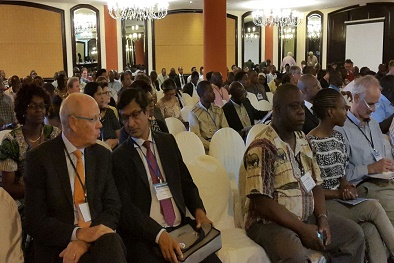A total of 85 oral presentations and 39 poster presentations were made under the following sub- themes:
– Hydrology and Global change;
– Water and environment;
– Water, Land and Agriculture;
– Water and Society;
– Sustainable Water Distribution and Sanitation; and
– Water Resources and Infrastructure Management.
– Special Session
The symposium sessions also included ad 3 plenary sessions and 7 special sessions. As a leading convention for capacity-building, partnership-building and follow-up on the implementation of international and regional processes and programmes in Integrated Water Resources Management, the symposium this year made key presentations during the special sessions that enabled further discussion and mapping the way forward on the fourth SADC Regional Work Programme.
Under the special session entitled “Powering Africa: Unlocking Opportunities for Integrated Water and Energy Development in SADC”, chaired by Dr. Jakob Granit, delegates discussed the need to push various renewable energy agendas, and the water/ energy nexus in order to alleviate the electricity deficit in the region.
The special session on “ Water accounting, IWRM and development planning in Southern Africa", chaired by Dr. Jaap Amtzen, confirmed to the need for water accounting to be institutionalised due to the great need to demonstrate to policy makers on how water is contributing to economic development.
The special session on “The payback – Eco framework: measuring the impact of scientific research in the water sector – Experiences from WARFSA funded research (1999-2014) re-examined the impact of the research projects funded from the 1st and 2nd phase of the WARFSA programme. The main outcome of the discussion pointed to the need for ‘research for impact’ and not just for publication. Discussions in that session also pointed to the need for research to be multi-disciplinary and focus on key regional developmental priorities at various scales.
The above sessions pointed to the direction of the 4th phase of the SADC Water Programme; the 4th Regional Strategic Action Plan (RSAP IV), which was approved at the recently held SADC Multi Sector Water Dialogue that was held in Windhoek, Namibia in September, 2015.
Speaking at the session on “the SADC research agenda for the Water Sector and RSAP IV”, convened by SADC and WaterNet, Dr. Kenneth Msibi, who made the presentation on behalf of the SADC Water Division outlined the SADC research agenda in light of the Regional Strategic Action Plan IV. The main outcome of the discussion pointed to the need for research to go beyond research to explore impact and thereby enhance the value of water research to regional development; create demand for research from government and change mind-set towards evidence based policy and decision making; make collective effort to leverage funding for research from member countries. Dr. Msibi further noted that the RSAP IV is to accommodate water and energy trade-offs. Additionally, an emphasis on the importance of water accounting was made, further stating that SADC would support the institutionalisation of water accounting in the implementation of the RSAP IV.
The symposium as a whole placed great emphasis on integration of knowledge, particularly involving scholars from the natural, medical and social sciences. 193 participants; comprising policymakers, academics, practitioners from water and related sectors, and cooperating partners were present; 19 of whom were local delegates.
